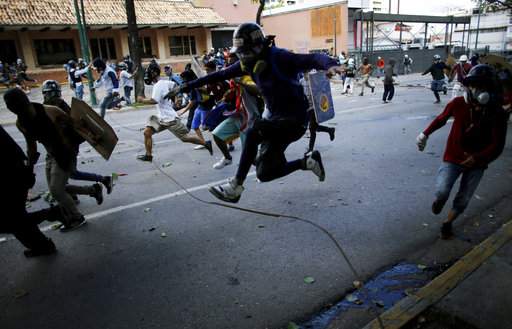Venezuelan capital mostly calm but residents uneasy ahead of unpopular vote
More than 3,000 people have been injured in clashes and more than 4,500 arrested in street protests that have grown increasingly violent.
The Maduro government banned all street protests through Sunday, threatening violators with prison sentences of up to 10 years, but protesters still blocked a dozen major thoroughfares in the capital, Caracas. And the crisis is creating fears in neighbouring countries of a refugee crisis, with 150 Venezuelans a day seeking asylum in Brazil alone and an estimated 550,000 living undocumented in Colombia.
Its oil exports to the USA totaled $10.2 billion in the year ending in May, according to Panjiva, a global trade research firm.
Venezuelan President Nicolas Maduro has said the vote is a chance to bring unity and peace to the country. “That is why it is fundamental to go out and vote for the Constituent Assembly, which will foster reunification, reconciliation and dialogue with all people”, said the Venezuelan Head of State, adding that we are in “the time of dream and hope”.
Anti-government protesters run from advancing Venezuelan Bolivarian National Guard officers. “We lose Venezuela”, said a 23-year-old-woman who identified herself as a student, face covered against the gas, declining to give her name to Reuters news agency.
Opposition leaders are urging Venezuelans to boycott Sunday’s election for delegates to an assembly to rewrite the constitution. If the assembly of supporters to the regime helps Maduro to tighten his grip on power , the Trump administration is ready to take significant action in response, according to a senior administration official who briefed reporters on the matter. The opposition refused to do this as well as stop supporting sanctions by the United States on the government, another Maduro demand.
Opposition activists, who launched a two-day nationwide strike Wednesday morning, have proved to be just as obstinate – responding to the protest ban by vowing that a huge anti-government demonstration will proceed as planned Friday.
The opposition says the government is so afraid of low turnout that it’s threatening to fire state workers who don’t vote, and take away social benefits like subsidized food from recipients who stay away from the polls.
This weekend’s election comes after months of sometimes deadly protests, amid an economic crisis that has seen many Venezuelans flee the country in search of easier access to food and medicine.
Global pressure to cancel the vote intensified Friday, with Vice President Mike Pence reiterating in a telephone call with opposition leader Leopoldo Lopez that the United States would respond with “strong and swift economic actions” if the election proceeds.
Colombia is pushing for a “peaceful solution, hopefully a fast and democratic one, so that the nation that we love – and I want to once again express my solidarity with the people of Venezuela – will soon come out from the darkness”, Santos said.
In announcing the United States sanctions, Treasury Secretary Steven Mnuchin said America was “standing by the Venezuelan people in their quest to restore their country to a full and prosperous democracy”.
Julio Borges, leader of Venezuela’s opposition-led National Assembly legislature, phoned into the news conference to discuss the upcoming vote.
The most recent reported fatality occurred Friday when an 18-year old protester was killed in San Cristobal.








